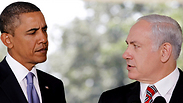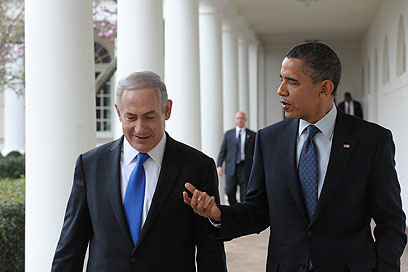
Palestinian issue is not the only thing US should reassess
Op-ed: The inadequate Israeli action vis-à-vis the Palestinians, compared to the abundant Israeli political activism in Washington, raise troubling questions about what is happening in Jerusalem's corridors of power.
The plain truth is that the president identified a real need to perform an in-depth examination because his previous policy to advance the establishment of a Palestinian state alongside Israel had failed. Washington remains without a state and without a policy now that the prime minister has clarified that such a state will not be established in the next four years, which include the last two years of Obama's term.
A reassessment of the American policy on Israel is required not only in regards to the Palestinian issue. The United States has a variety of interests and activities across the Middle East and Arab world. Its forces are fighting the Islamic State's terror, and it is involved in assisting the Arab coalition forces which are fighting the Iranian takeover of Yemen.
The success of the Saudi air strikes is the result of excellent target intelligence the US is providing the kingdom's pilots with, a reminder of the days in which excellent American intelligence provided to Saddam Hussein in the 1980s got the Khomeini regime down on its knees and forced Iran to beg for a ceasefire.
As the nuclear talks reach a framework agreement, the need increases for a reliable strategy against Iran on the other fronts in the region.
It's likely to assume that documents dealing with the reciprocal relations between the Israeli-Palestinian conflict and the rest of the components in the region will also be put on the table in the White House and in the State Department in Washington.

The harbinger of Israel's conduct vis-à-vis the Palestinians is concealed in the prime minister's decision to release the tax money which was frozen about four months ago. It happened at the beginning of the election campaign, and together with other moves, punishing the Palestinians served the propaganda needs of those who decided on it. Once the internal political need was over, the move was no longer relevant.
The arguments in favor of the decision and the way it was made point to its nature. As reported, the "defense establishment" and defense minister recommended it for humanitarian reasons. This is a strange argument: The humanitarian situation deteriorated, among other things, because of the confiscation of funds belonging to the Palestinians, and had this move not been taken, there would have been no need to fix what it distorted.
But the main mention of the reasoning was aimed at stressing that the Israeli move was devoid of any political meaning. It emphasized a reality of no hope for peace in the Israeli-Palestinian relationship, and it is similar in its essence to the reasons for easing the siege on Gaza (i.e., on Hamas). In both cases, the Israeli political echelon is driven by humanism in its relations with its neighbors in Gaza and Judea and Samaria.
Alongside Israel's "no policy" on the Palestinian issue, the US will be required to investigate and understand the meaning of the latest election results. Since 2012, Israel has considered itself free to act openly and firmly in the internal American political court. Its attempt to defeat an incumbent American president failed.
There are no visible signs that the US worked to defeat an incumbent Israeli prime minister. Had it done so, it would simply be doing what Israel did in the latest presidential election.
This is particularly obvious in light of US House of Representatives Speaker John Boehner's visit to Jerusalem this week, which will likely speed up the move that has already been started – to exchange the past defeat with a future victory in 2016.
If we see a future American ambassador establishing contacts and creating political capital among the joint list of Israel's Arabs, will it be a worthwhile price to pay in exchange for the Israeli ambassador running from one Republican friend to another?
And if we're already talking about prices, there's the old Jewish joke that Israel shouldn't declare war on the US lest it wins.
The inadequate Israeli action vis-à-vis the Palestinians compared to the abundance of Israeli political activism in Washington raise troubling questions about what is happening in the corridors of power in Jerusalem.
Efraim Halevy is a former Mossad chief.










